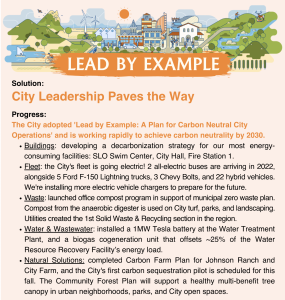To: The City of SLO
Re: The City of SLO’s Climate Action Plan work program for 2023 – 2027
Input to the Climate Action Plan online “annotation” submissions.
Our annotations to the Climate Action Plan are based on the following rationale for recommending how the City of SLO can do more to reach our annual MTCO2e reduction target by helping our citizens understand the facts in relation to diet and climate change.
Climate/Environment Benefits: The City of SLO has an opportunity to further reduce the remaining 111,030 annual MTCO2e reduction target to reach its 2035 decarbonization goal by helping our community understand the facts associated with food choices and climate change.
Greenhouse gas (GHG) emissions from livestock supply chains are at 14.5% of all human-induced emissions. Therefore, the livestock sector plays an important role in climate change, specifically via methane and nitrous oxide. These gases are both the most damaging to our atmosphere and the most beneficial to our atmosphere when mitigated.
According to the online app at Resilient SLO https://resilientslo.org/ going plant-based is the 2nd best action you can take after buying an EV. We’re not entirely clear on the math here but think it makes an important point: for every 2 community members going plant-based, we acquire the MTCO2e reduction equivalent of an EV replacing a gas-powered vehicle. Our organization is consistently asked to help folks “make the switch” to plant-based. We have at least 1000 followers and members.
Similar to sourcing our energy from renewable sources generated outside the county, diets that shift to plant-based foods reduce atmospheric methane and nitrous oxide levels from sources outside the county such as the Central Valley. Additionally, major water savings result from reducing both water used to grow food for animals and water used to grow the animals themselves.
While not addressed directly in SLO’s Climate Action Plan, successfully mitigating man-made atmospheric climate change necessitates the preservation of global rainforests and biodiversity. It requires staving off runaway destruction of planetary forests, fresh waterways, and ocean ecosystems occurring primarily as a result of production-animal agriculture. Overall, the livestock sector is one of the leading drivers of global deforestation and is linked to 75% of historic deforestation in the Brazilian Amazon rainforest. https://www.sciencedirect.com/science/article/abs/pii/S0048969715303697 Nearly a third of biodiversity loss to date has been linked to animal agriculture. Further amplifying water and air pollution, global livestock produces seven to nine times more sewage than humans, https://link.springer.com/article/10.1007/s10021-011-9507-x most of which is left untreated. Global livestock also discharges pesticides, antibiotics, and heavy metals into water systems.
In summary, animal agriculture specifically:
- Accounts for five percent of global anthropogenic carbon dioxide emissions; https://www.fao.org/3/i3437e/i3437e03.pdf
- Represents 44 percent of anthropogenic methane emissions, the primary driver of climate change related to livestock, as methane is 34 times more potent than carbon dioxide over 100 years; https://www.fao.org/3/i3437e/i3437e03.pdf
- Comprises 44 percent of all anthropogenic nitrous oxide emissions, the most potent GHG; https://www.fao.org/3/i3437e/i3437e03.pdf and
- Makes up 75-80 percent of total agricultural emissions. https://www.fao.org/climatechange/36143-0fa4483057747f41c08183b702ec5954e.pdf
Furthermore, air and water pollution can be directly attributed to the livestock sector, which is the largest contributor to global water pollution.
Health & Resiliency Benefits: A large and growing number of healthcare professionals now agree: that plant-based diets play a key role in improving health and lowering healthcare costs. We all stand to benefit from eating plant-based foods.
Economic Benefits: California is home to the highest concentration of the 600+ companies worldwide dedicated to producing alt-proteins (1,000 if you include companies whose product line is not limited to alt-proteins). Half of these companies were founded since the start of 2015 according to a Good Food Institute (GFI) analysis of PitchBook, an industry data service. At least 55 plant-based and 11 cultured-meat alternative-protein companies are headquartered here in California.
Since the start of 2015, venture funds and others have invested $9.2 billion in alt-protein startups worldwide. Roughly $2.6 billion of that has been invested in plant-based meat companies, according to GFI’s analysis.
SLO will benefit tremendously economically by getting ahead of this trend as plant-based food and restaurant businesses continue to emerge locally. Our brand value as a tourism destination will increase as a result of nurturing a vibrant plant-based hospitality sector.
***
We, therefore, request that the SLO Climate Action Plan work program for 2023 – 2027 include for the following:
- Perhaps in the “Lead By Example” Pillar:
A) Halt the global expansion of deforestation attributed to animal agriculture, specifically, divest all City investment dollars away from companies involved in factory farming or rainforest destruction.B) Endorse the Plant Based Treaty, https://plantbasedtreaty.org/ a growing coalition of cities and regions globally that acknowledge the importance of increasing plant-based food consumption as a means of addressing climate change. (Note, a page for SLO will be up soon).
- Perhaps in the “Natural Solutions” Pillar: Incentivize our plant-based food economy, specifically, dedicate City budget to support plant-based businesses via the following ideas:
A) Create cash awards for “best plant-based business ideas” as judged by a panel from the SLO Hothouse or similar organization able to objectively assess entrepreneur pitches;B) Fund improvements be made to an existing SLO Plant Based Food directory application created by the Central Coast Vegans; https://ccvegans.org/get-food/
C) Hire an economics or business professor to estimate the existing and future potential size of our plant-based economy in terms of jobs and economic impact. This could also be extended to include other businesses with direct positive impact on climate change.
D) Fund public information campaigns that explain the benefits of plant-based diets in mitigating climate change via reducing methane and nitrous oxide atmospheric gases, slowing the destruction of rain forests that absorb CO2, slowing ocean acidification, and restoring biodiversity within our planetary forests, fresh waterway, and ocean ecosystems.
Sincerely,
The Central Coast Vegans and Friends





 New program to let SLO County agriculture students work with local animal sanctuary
New program to let SLO County agriculture students work with local animal sanctuary CCV “Best Of” Awards 2023 & 30 Great Plant-Based Options
CCV “Best Of” Awards 2023 & 30 Great Plant-Based Options Announcing the 2023 CCV “Best Of” Award Candidates
Announcing the 2023 CCV “Best Of” Award Candidates
james
Thank you for raising awareness of this important issue and calling on the city to take action.